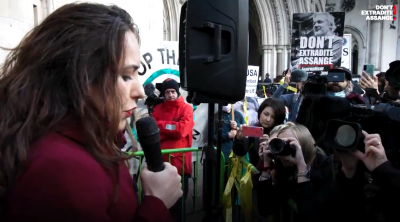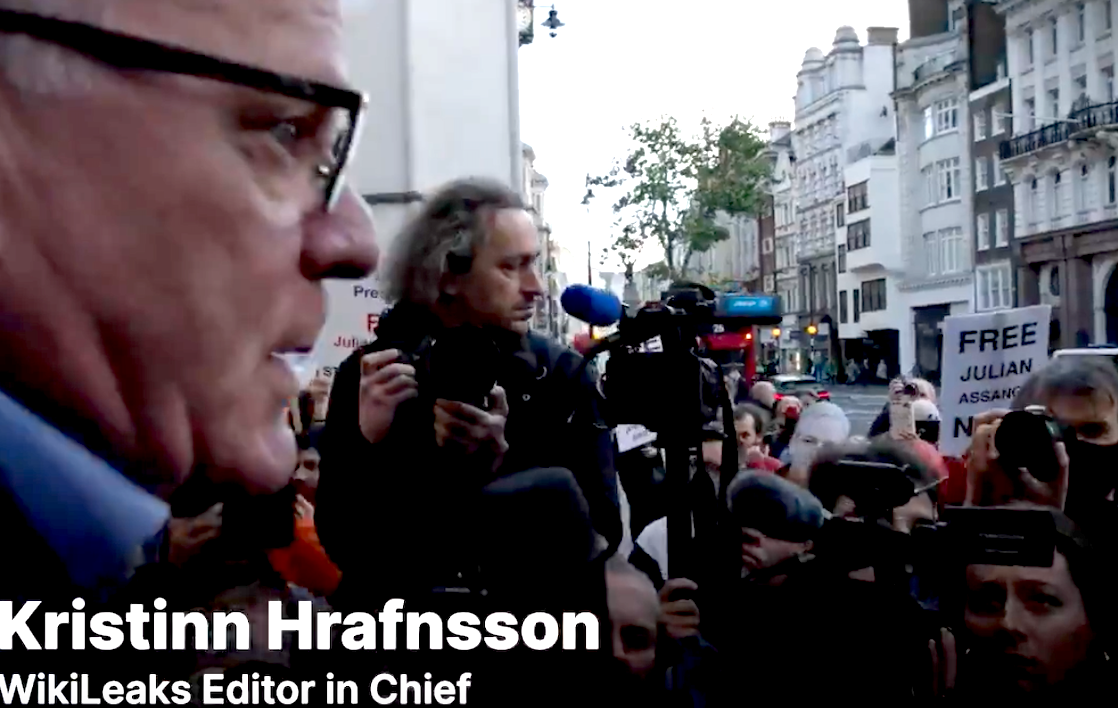Day Two — ‘CIA Tried to Kill Assange;’ US: ‘He’s Only Moderately Depressed & Won’t Go to Isolation’

All Global Research articles can be read in 51 languages by activating the “Translate Website” drop down menu on the top banner of our home page (Desktop version).
Visit and follow us on Instagram at @crg_globalresearch.
***
The two-day U.S. appeal against the denial of extradition of Julian Assange has ended in London with the U.S. promising humane prison conditions and Assange’s lawyers saying the CIA tried to kill him.
Consortium News had remote video access to the courtroom for the two-day hearing.
The United States vowed that only a “moderately depressed” Julian Assange would serve time in a humane U.S. prison if he is extradited, while lawyers for Assange told the High Court that the Central Intelligence Agency plotted to assassinate him, as a two-day U.S. appeal hearing came to a close on Thursday in London.
The U.S. is seeking to overturn a lower court decision in January not to extradite the imprisoned WikiLeaks publisher on the grounds that he is at high risk of suicide if he faced time isolated in a harsh American prison.
A prosecutor for the U.S. set out over the course of the hearing to convince the two High Court justices to reject that ruling, arguing that Assange is not seriously ill and would not be placed in solitary confinement should he be sent to the U.S.
Assange’s lawyers on the other hand defended the lower court finding of severe mental conditions and high likelihood of committing suicide and sought to dismiss American assurances to Britain that Assange would not be put under Special Administrative Measures (SAMS) or housed in the maximum security ADX Florence prison in Colorado.
They went further, telling the court that the foreign intelligence service of the government requesting Assange’s extradition had seriously considered murdering or kidnapping him.
CIA Plot
Assange lawyer Mark Summers QC essentially told the court that before the United States tried to legally extradite him from Britain it discussed concrete plans to extract Assange from Britain by kidnapping him and rendering him to the United States, possibly through a third country.
Summers began by pointing out that it would be the very Central Intelligence Agency, which plotted to harm him, that would ultimately determine whether Assange would be imprisoned in SAMS. “The relationship between the CIA and Mr. Assange is vast and it’s not before this court,” said Summers.
Chief Justice Ian Burnett, one of the two High Court judges, interjected, “It’s not contested that the CIA is intensely interested in Mr. Assange.”
“Yes, but what they are prepared to do,” Summers said. “I invite my Lords to understand the lengths they went to against Mr. Assange.” He then ran through the details of a Yahoo News! report in September about how the CIA plotted against Assange.
“It seems there were discussions in the Oval Office about killing him and sketches were sketches drawn in the summer of 2017 as matters escalated to render him back to America from the U.K.,” Summers said. “But the U.K. refused to go along with this.”
Former CIA director Mike Pompeo “is on the record that some things are true and it’s under Congressional investigation,” Summers said. He referred to testimony in Assange’s September 2020 hearing when former employees of the Spanish security firm UC Global first talked about plans to kidnap or poison Assange.
James Lewis, QC, the prosecutor for the U.S. said nothing about this in his 30-minute rebuttal at the end of the hearing. During the September 2020 extradition hearing Lewis called talk of threats to assassinate Assange “palpable nonsense.”
Assurances Challenged
Lewis spent most of that time defending the assurances the U.S. has given Britain that Assange would not face harsh conditions in a U.S. prison. He first addressed the defense contention that because these assurances came after the lower court judgement that they are new evidence and should be rejected.
“All that has happened is that the requesting state had every opportunity to give assurances and chose otherwise, and then ran a case for two years and lost,” Summers for the defense had earlier said. “Nothing justifies the U.S. changing its case in this way.”
“it is absurd to say we had every opportunity” to provide the assurances before the judgement, Lewis responded. “It is proper to deal with assurances at any stage. This is not a sea change. Assurances are not evidence. The fact is it is common sense that an assurance will be reactive in nature. You can’t anticipate area a judge is focused on until the judge puts out a judgement.”

WikiLeaks Editor in Chief Kristinn Hrafnsson addressing supporters of Julian Assange outside the High Court where the U.S. appeal hearing was held. Oct. 28. (Don’t Extradite Assange Campaign)
Lewis cited a case when the High Court in an extradition case gave a government an additional 14 days to come up with assurances. He cited another case in which the requested person was freed but then the extradition process was restarted when assurances were provided. “We could start again with Assange,” Lewis said ominously.
Summers brought up several cases in which a requesting government had received assurances from the United States that were not fulfilled. He called U.S. assurances “conditional” and “aspirational” citing the language of the assurances that if Assange after imprisonment harmed U.S. national security he could be placed in harsh isolation. Summers said one must stick to the letter and not the spirit of U.S. assurances. He again referred to the CIA plot against Assange.
“Nothing about this is case normal,” he said. “This is a case of credible evidence of U.S. plans to do serious harm to Assange, contemplating assassination, rendering, kidnapping and poisoning and it is worthy an investigation of these assurances that this same government asks us to believe.”
But Lewis said,”The U.S. has never broken diplomatic assurance.”
And because of this, “Mr. Assange now knows he is not going to SAMS or ADX Florence so his suicidal ideology [sic -ideation] should subside,” Lewis said. “He now knows he will get adequate medical care.”
Then Lewis quoted three expert witness from the September hearing, including one from the defense, who each said Assange was only “moderately depressed” rather than beset with a combination of mental conditions that would drive him to suicide if extradited, as the lower court ruling said.
Lewis’ message to the judges was that both pillars of the lower court judgement were demolished: Assange is not seriously ill and he won’t be going to a harsh U.S. prison.
“You have given us much to think about and we’ll take time to consider it,” Burnett told the lawyers as he closed the hearing.
He did not give a date when the High Court’s decision will be made.
*
Note to readers: Please click the share buttons above or below. Follow us on Instagram, @crg_globalresearch. Forward this article to your email lists. Crosspost on your blog site, internet forums. etc.
Joe Lauria is editor-in-chief of Consortium News and a former UN correspondent for The Wall Street Journal, Boston Globe, and numerous other newspapers. He was an investigative reporter for the Sunday Times of London and began his professional work as a stringer for The New York Times. He can be reached at [email protected] and followed on Twitter @unjoe.
Featured image: Stella Moris, Julian Assange’s partner, addressing his supporters outside the High Court on Thursday during the U.S. appeal hearing in London. (Don’t Extradite Assange Campaign)

